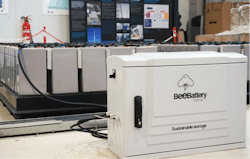No Bull: University in Spain to develop Solar Microgrid in Pamplona
Researchers from the Public University of Navarre’s (UPNA) Institute of Smart Cities (ISC) are developing a new solar microgrid on the university campus in Spain.
The initiative is part of the demonstration projects that are being implemented in Pamplona under the STARDUST project, which aims to make the city low carbon and smarter.
The smart microgrid will use second-hand stationary batteries from EVs and a solar photovoltaic source. The batteries will provide peak power supply.
The coordinator of the initiative, Pablo Sanchis highlighted the challenges of electric transport, saying, “Firstly, the charging of buses has to match the timetables on each route. Therefore, the time that the bus remains stationary at the terminus station is key to ensure sufficient charging of the bus’s electric storage system. Secondly, the limited charging time implies a very high demand for electrical power”. He said that supplying this peak power is not easy.
In this context, researcher Alfredo Ursúa added, “the design of advanced charging stations that incorporate not only the electronics needed to connect the bus to the distribution network, but also a stationary back-up electrical storage system and a renewable electricity generation system can overcome the aforementioned drawbacks and facilitate the transition to an electric urban transport system.”
He added that the installation comprised a back-up storage system, consisting of second-life lithium-ion batteries and roof-mounted photovoltaic panels, “Both form a microgrid designed to be connected either to the internal network for experimental validation tests or, in the future, to the entrance of the nearby pantograph post of line 9 of the Regional Urban Transport that is already electrified. The microgrid is managed and controlled in a coordinated manner from a control unit, with the possibility of remote access.”
A monitoring station will also be installed in the lecture theatre that will show real-time information about energy flows. It will also provide detailed information through graphs and energy tables. The monitoring system will be remotely accessible via a website.
The STARDUST partners include the Government of Navarra; the National Centre for Renewable Energy (CENER); BeePlanet, which provides the batteries; and the local authority Mancomunidad de la Comarca de Pamplona which runs the electric bus network.
About the Author
EnergyTech Staff
Rod Walton is senior editor for EnergyTech.com. He has spent 17 years covering the energy industry as a newspaper and trade journalist.
Walton formerly was energy writer and business editor at the Tulsa World. Later, he spent six years covering the electricity power sector for Pennwell and Clarion Events. He joined Endeavor and EnergyTech in November 2021.
He can be reached at [email protected].
EnergyTech is focused on the mission critical and large-scale energy users and their sustainability and resiliency goals. These include the commercial and industrial sectors, as well as the military, universities, data centers and microgrids.
Many large-scale energy users such as Fortune 500 companies, and mission-critical users such as military bases, universities, healthcare facilities, public safety and data centers, shifting their energy priorities to reach net-zero carbon goals within the coming decades. These include plans for renewable energy power purchase agreements, but also on-site resiliency projects such as microgrids, combined heat and power, rooftop solar, energy storage, digitalization and building efficiency upgrades.
